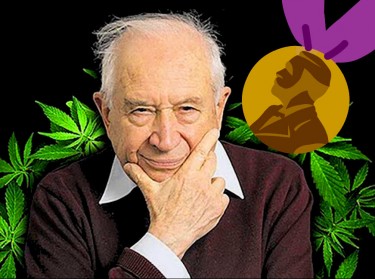
Rest In Peace Raphael Mechoulam
Raphael Mechoulam, godfather of cannabis research, passes away
Here are his top 5 contributions to marijuana as we know it today
In the world of cannabis, we have research to thank. It is thanks to the hard work and efforts of people around the world who have dedicated the time and resources to study cannabis and its health benefits. Because of research, we know what cannabis is good for and how it works in the human body.
However, no one has done more for cannabis research than Dr. Raphael Mechoulam. The Israeli chemist, researcher, and professor of medicinal chemistry has devoted much of his life to the study of marijuana. So much so that he was nicknamed the “Godfather of Cannabis Research” early on. In 2016 his efforts were recognized and he received the Lifetime Achievement Award at Cambridge for several decades of groundbreaking research. This is just one of the many awards he received during his lifetime.
Sadly, he just passed away at the age of 92. Learn in honor of Dr. Mechoulam more about his major contributions to cannabis research:
-
Isolated THC for the first time in history: In the early years of his research in 1963, Dr. Mechoulam and his team aim to understand the chemistry of cannabinoids. Not long after, they successfully isolated THC (tetrahydrocannabinol), one of the two most famous cannabinoids in marijuana and the one responsible for the plant’s psychoactive effects. After he isolated THC, they were able to understand the chemical structure of THC and eventually even synthesize it.
The isolation of THC was incredibly fundamental to tons of further cannabis research. It also soon became the more popular cannabinoid due to the high it causes, but not long after CBD (cannabidiol) became just as popular for other equally important reasons.
-
Discovery of the Entourage Effect: Dr. Mechoulam discovered the entourage effect in 1999 with Dr. Shimon Ben Shabat. It refers to the synergistic way that cannabinoids work together and usually often amplify the benefits of one another when consumed together, whether taken alone or in isolation. He and his team observed that certain cannabinoids had little to no effect when taken alone, but when combined with THC or other cannabinoids, they were actually very beneficial.
Understanding the entourage effect is now important not only for scientific purposes, but also for consumers. It can help medical patients better understand the types of products they should be consuming. This is especially important given that there are dozens of different forms of cannabis today, ranging from CBD and THC isolates to whole-plant medicinals. People take isolates for specific reasons, although because of the entourage effect we now know that if you want to maximize marijuana’s healing properties, it’s best to take whole-plant medicine instead.
-
Introducing the benefits of CBD to treat epilepsy: Back in 1980, Dr. Mechoulam presented the results of a small study he was reviewing, the results of which suggested that CBD may be beneficial in reducing seizures in epilepsy patients. He found that CBD was more effective than a placebo, after which he expected it would spark interest from large pharmaceutical companies in developing CBD-based drugs for epilepsy.
That didn’t happen, at least not for several decades. Because of its revolutionary research, THC had to share the limelight with CBD, which many people didn’t initially think was important—but it was. CBD doesn’t get you high, but apparently it had powerful anti-epileptic properties that no other pharmaceutical drug could match.
Fast forward to the present day and it is now easy to see that Dr. Mechoulam was up to something big studying CBD when no one else was paying attention. CBD is now a household name in cannabis, being processed into everything from beverages to capsules, cosmetics, edibles and more. Thousands of people use CBD not only for epilepsy, but also for anxiety, stress, depression, inflammation and general well-being.
-
Discovered endocannabinoids: The research of Dr. Mechoulam also led to the discovery of endocannabinoids in 1992, specifically anandamide, a compound produced in the human body that is able to activate the CB1 receptor, the same receptor that binds to THC. This was a major milestone as it was the very first endocannabinoid ever discovered.
His discovery of anandamide not only had a major impact on cannabis research, but also far-reaching benefits for the world of biology, biochemistry, chemistry, medicine, and pharmacology at large.
-
Discovered a cannabinoid more potent than CBD and THC: Dr. Mechoulam didn’t stop working on his cannabis research. In 2020, he even discovered another compound called EPM301, which turned out to be more potent than THC and CBD. He was 88 years old when EPM301 was discovered.
It took a while for EPM301 to be discovered due to its instability, although Mechoulam developed a method to modify the acids that allowed them to be stable for a long enough period of time for it to be used in further studies and experiments. Additionally, they found that EPM301 could be helpful in treating nausea and anxiety, although there’s a possibility it could also help with cancer, chemotherapy, psoriasis, and inflammatory bowel syndrome.
Diploma
dr Mechoulam is the only person in the world who has contributed so many breakthroughs for the cannabis industry, medicine and patients. Thanks to his lifelong work, we know more about cannabis than ever before and it has helped transform the lives of millions of people around the world.
DR. MECHOULAM ON THE NOBEL PRIZE, READ MORE…

WHY dr MECHOLAUM WINS A NOBLE PRIZE FOR HIS WORK IN THC?

Post a comment: